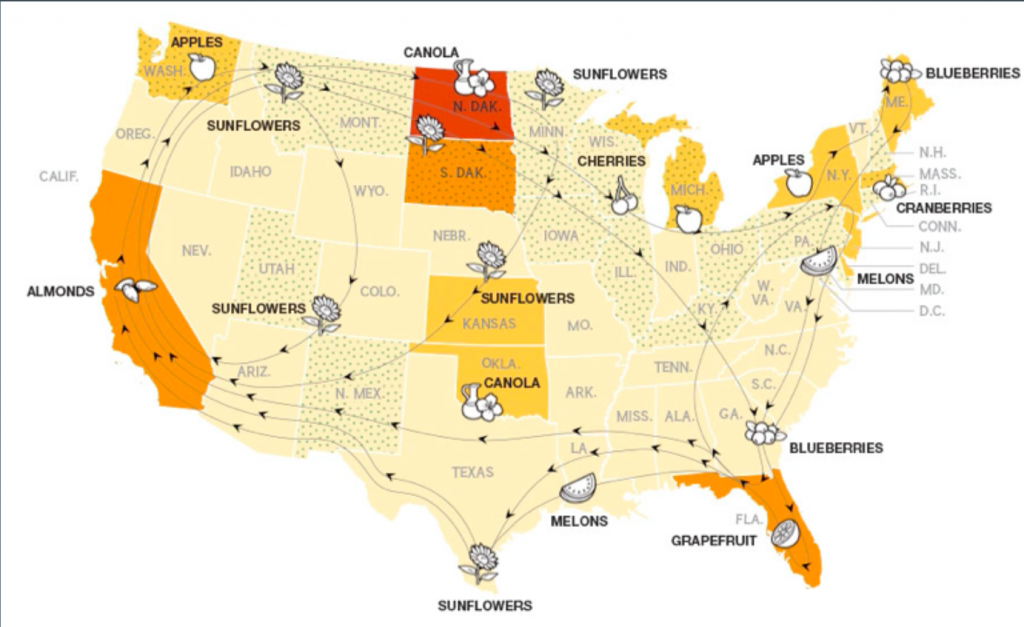Meet GRASP Award Winner and #EcoChampion

We concluded our Birds, Bees, & Trees series with Austin Martin, the 2020 Graduate Research Award Sustainability Program (GRASP) award winner and Ph.D. candidate in Geography and Urban Studies. Austin presented his findings on urban honey bees and pollinator forage as he examines how urban development and social control factor into urban pollinator systems.
Austin’s research seeks to better understand how capital flows through the urban built environment and what this means for urban ecosystems, specifically the health of native and non-native bees. His research considers the critical, social aspects of sustainability offering integrated and transformative climate solutions to urban communities and organizations.
Let’s dive deeper into Austin’s research.
The gateway to larger ecological questions.
In the past decade, honey bees have rightfully garnered much public attention and concern. They sustain our multibillion dollar agricultural industry, which is heavily reliant on monocropping. Industrial scale beekeepers transport their hives across the United States to employ millions of honey bees as pollinators. As featured on the map, these crops include sunflowers, apples, canola, cherries, blueberries, cranberries, melons, and grapefruit, all across the US.
Austin gained the first-hand experience during his time at the University of Michigan. He learned that honey bees are important not only for our food system but for human-nature connection. There are no other species that humans can cultivate and connect within the way that humans can with honeybees because of their colony scale.
Cities as a haven for bees.
Throughout his research, Austin found that honey bees in rural landscapes were not thriving nearly as well as honey bees in urban landscapes. He saw this same counterintuitive pattern with honey bees in the urban landscape of South Philadelphia rooftop.
The collapse of beehives begins with the poor biodiversity of flowers for bees to pollinate with. Beehives continue to decline through a series of self-reinforcing feedback loops including various toxins, weather conditions, parasites and poor nutrition.
Bees normally travel up to 3 miles to pollinate, but not in urban landscapes! In urban areas, the landscapes are rich enough with forage that the bees pollinate locally, increasing their lifespan. People plant new and diverse flowers in cities too. This brings new and unique pollination opportunities to bees.
Rethinking urban green spaces.
The data demonstrates a strong connection between wealth and bee richness. Low income areas had both higher bee abundance and higher richness. Low income communities and stewards of these urban green spaces also suffer from public disinvestment and a lack of capital. In neighborhoods and parks such as Cobbs Creek, we see this manifest in more woody vines, greater disarray in parks and sometimes higher occurrences of crime. This calls for a rethinking of how to manage our urban spaces.
Austin’s research better characterizes this uneven development across urban landscapes. He challenges our traditional notions of urban greening, asking if what is good for urban greening is truly good for urban ecology.
As a Temple community, we are in constant pursuit of a more ecologically, politically, and socially viable city. Leveraging this critical study of urban pollinators is an important step in centering community control of public spaces. We can strive for a more just and sustainable commons which equitably serves all Philadelphians, our flora, and our fauna.
Insight from Austin.
“As a beekeeper, I have learned that a good pesticide to use is called Oxalic acid which is relatively benign to the bees and kills the mites in the hive.”
“My favorite bee is the Blue Banded bee native to Australia and of course honey bees with my childhood connection.”
Contact Austin: aumartin@temple.edu
Check out the Philadelphia BeeKeepers guide!
Learn more about the GRASP Award!
The Temple University Graduate Research Award Sustainability Program (GRASP) advances the university’s goal of expanding sustainability research by providing funding to a graduate student research project focused on sustainability.

